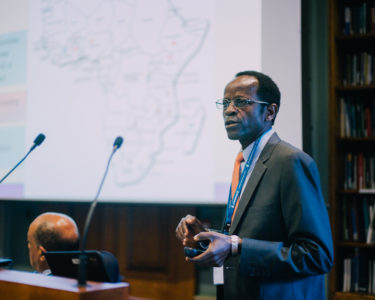Original post on PEI website.

On March 15, Dr. Robert Mwanga, one of the 2016 co-winners of the World Food Prize (WFP) contributed to a discussion on the Future of African Agriculture at the Planet Earth Institute (PEI) in London. Robert, a sweetpotato breeder at the International Potato Center (CIP) gave a presentation on progress in breeding orange-fleshed sweetpotato (OFSP) in sub-Saharan Africa. The seminar was opened by the Rt Hon Lord Paul Boateng, PEI chair.
Robert explained that pre-existing sweetpotato varieties in sub-Saharan Africa experienced significant yield losses of 50-90% due to sweetpotato virus disease, and were low in nutrients. In response, together with colleagues at CIP, they utilized accelerated breeding cycles to come up with OFSP varieties with major desirable traits that varied across various countries in SSA. Some of the desirable traits include greater resistance to disease, high beta-carotene concentrations (precursor to Vitamin A) and drought tolerance. Since 2009, the successes of his work have been shared throughout SSA, with nine countries releasing 56 new superior varieties; 40 of which are orange-fleshed. This will go a long way in the fight against vitamin A deficiency and associated health problems.
View Robert’s presentation at PEI below:
Q and A with Dr. Robert Mwanga and Dr. Jan Low
Following the seminar on future of Agriculture in Africa, Robert was joined by colleague and co-winner of the 2016 WFP, Dr. Jan Low. They discussed key challenges facing African farmers today and gave an overview of their award winning work on bio-fortification of OFSP.
1) What are the key challenges in African agricultural development?
According to Robert, they included drought affecting staples such as maize, pests and diseases, access to markets among others.
“To add to what Robert said, I believe that agriculture has to be better integrated with other sectors. Furthermore, governments need to prioritise the development of hard infrastructure, and create the conditions that allow greater private sector investment in agriculture”, said Jan. She added that young people must be encouraged to take on an active role and that with the right combination of policy and investment, most issues can be addressed.
2) Could you please tell us about your work on the bio-fortified orange-fleshed sweet potato?
Robert noted OFSP has a great potential to address the problem of vitamin A deficiency that currently affects 100 million Africans. OFSP could also help tackle food shortage where Africa spends $US35 billion importing food. “Sweet potato can be grown two-three times a year where there is steady rain or irrigation. The crop also has high yields and farmers can produce several crops a year”. Working together with partners, “we created new varieties, reduced the breeding cycle from eight years to four years, and used a variety of methods to get the crop to different segments of the population.”
Jan adds “I questioned conventional wisdom’ that held people in Africa and Asia would not eat OFSP, “we learnt that it wasn’t actually the color that deterred people from eating these varieties, but rather the texture. In sub-Saharan Africa, particularly in Uganda, Robert’s home country, people love high dry-matter varieties that are very mealy. As a result, we recognized that we needed to breed orange-fleshed sweet potato varieties with higher dry matter content to win the support of the adults.”
3) How can the orange-fleshed sweet potato help enhance food security in Africa?
Jan said OFSP has flexible planting, harvesting times and can be stored quite easily. “We’ve been breeding for early maturing sweetpotato varieties that are ready in three-five months, rather than the six-eight-month process for traditional varieties. Also all parts of the plant can be used; humans can consume roots and leaves while livestock can utilize vines and leaves. Robert on the other hand noted the crop gives high yield in a short time. “We have increased its vitamin A content to combat vitamin A deficiency, but sweetpotato also has folic acid and anticarcinogenic agents (anthocyanins), which prevent cancer. It is also loaded with minerals such as potassium, magnesium, and calcium”.
4) What are your future research projects?
Robert notes that they are breeding fast and smart to deal with climate change and new problems that come up. “By 2020, we expect, and we’re well on our way to developing, an OFSP variety that is also biofortified in iron” says Low.
Continue reading on the PEI website: Five questions with Dr. Robert Mwanga and Dr. Jan Low
Additional reading: Orange fleshed sweet potato and lessons for a Code Red crop crisis
